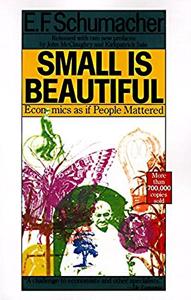
Want to learn the ideas in Small Is Beautiful better than ever? Read the world’s #1 book summary of Small Is Beautiful by E. F. Schumacher here.
Read a brief 1-Page Summary or watch video summaries curated by our expert team. Note: this book guide is not affiliated with or endorsed by the publisher or author, and we always encourage you to purchase and read the full book.
Video Summaries of Small Is Beautiful
We’ve scoured the Internet for the very best videos on Small Is Beautiful, from high-quality videos summaries to interviews or commentary by E. F. Schumacher.
1-Page Summary of Small Is Beautiful
Overview
Is bigger always better? Not according to the world-renowned economist, E.F. Schumacher. On the contrary, he posited that “small is beautiful” and that economists should value life on earth over income and profit. His essays argue against our modern economic system because it legitimizes greed, values money above all else, depletes resources and sucks the meaning out of lives.
In this key points, you’ll also learn that universal prosperity would not lead to peace; how growth can be destructive; and that nuclear energy could spell ruination instead of salvation.
Big Idea #1: The modern economic system relies on depleting the Earth’s natural resources.
Economic systems have brought prosperity to the Western world, but they’ve also come with a price. The economic system has removed us from nature and we are constantly destroying it.
For example, we treat fossil fuels as income rather than capital. This leads us to squander these resources since they’re treated like a never-ending stream of goods. The modern economy regards them this way because it justifies waste.
If we viewed fossil fuels as capital rather than income, we would be more concerned about conserving them. However, we act like they’ll never run out—which, of course, they will.
It is not possible for humans to continue using fossil fuels, because they will eventually run out. This would threaten the foundation of our economy, which requires a steady energy supply. The economic system itself also threatens two types of natural capital: tolerance margins and human substance.
Since World War II, the world has seen a dramatic increase in industrial production. This threatens nature’s tolerance margins. Our actions are harming the environment at a rate much greater than its natural rate of regeneration. The economic system also devalues humans, who are reduced to little more than cogs in the economic machine. For instance, most people don’t find their work fulfilling and many spend their lives doing back-breaking labor.
The current economic system is threatened by the inability of people to live properly. If they can’t make a living, they won’t be able to sustain the economy.
Big Idea #2: Universal prosperity alone can’t ensure lasting peace.
An analysis of the history of economics and political stability reveals an interesting pattern: rich people tend to be more peaceful than poor ones. Therefore, if we can make everyone equally prosperous, then we could have a much more peaceful world.
Let’s consider this idea by examining three points:
- Universal prosperity is possible.
- We can attain universal prosperity through the materialist philosopher’s dictum “enrich yourself.”
- Doing so will lead us to peace.
When we break down the idea of peace through universal prosperity into these three points, it becomes clear that the theory doesn’t hold up.
We can achieve universal prosperity by consuming more fossil fuels. But we have to question this idea because the environment will only sustain so much damage. If we keep consuming at our current rate, pollution problems will increase.
The second point is problematic because greed and envy are the main drivers of self-gain. If those vices get built into our economic system, GDPs will rise for a time but people’s feelings of frustration, alienation and insecurity will increase as well. Eventually, populations will be paralyzed by meaninglessness.
The third point is that we can’t achieve peace through prosperity. We can only attain universal prosperity by being greedy and envious, which destroys happiness and meaning and will eventually lead to war. Furthermore, we can’t sustain prosperity without damaging the environment.





